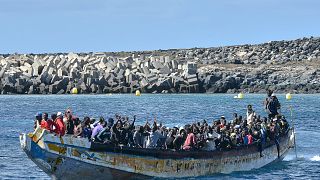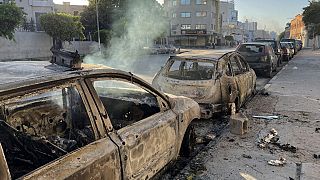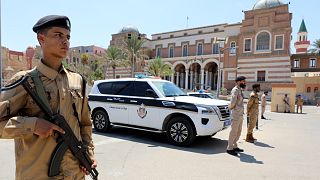Libya
Migrants rescued from the Mediterranean Sea off the Libyan coast have shared their ordeal while being cared for on board a ship run by Doctors Without Borders (MSF), an international humanitarian organization.
The crew of the Geo Barents ship performed two separate rescue operations on Friday saving 258 people.
Survivors received medical assistance, legal consultancy and had the chance to tell their loved ones that they were alive thanks to an SMS transmission service offered by MSF via satellite.
Among the survivors were many Syrian families and unaccompanied minors, Egyptians, Bangladeshis and several Subsaharan people, mainly from South Sudan.
One of the migrants, a 16-year old Syrian, spoke about his relief after being rescued from a severely overcrowded wooden boat in the central Mediterranean Sea, approximately 30 miles north from the Libyan coast of Tripoli.
“When I saw them (MSF rescuers) I started crying, because I was so, so happy for that. I was so happy. This is my dream in life, for me and for my family."
He tried the perilous sea crossing five times before being rescued.
The young Syrian man, who preferred not to publish his name and family name, spent 13 months in Libya on his own.
Some of his friends died at sea in a shipwreck and an unidentified Libyan patrol boat shot at his boat during one of the attempts.
He wants now to warn whoever intends to do the same trip to not dare crossing from Libya, as it is “too hard” and too dangerous.
Various United Nations human rights reports have documented widespread and systematic human rights violations and abuses against migrants in Libya.
The first rescue operation was triggered after being spotted by Syrian cultural mediator Karam Alhindi during his shift on the bridge.
“It was like a dream, because it was in the middle of the night, super foggy," he recalled the moment he saw the boat, adding "then you start hearing the sound of people shouting.”
162 people were on board and were almost sinking.
The captain of the MSF ship steered and kept a safe distance, while rigid hulled inflatable boats (RHIB) were deployed at sea to provide life jackets.
Over recent months, rescue groups say Italy’s hard-line government headed by Prime Minister Giorgia Meloni has made it harder for humanitarian vessels to operate.
They say the government often assigns their ships to ports further north after a single rescue, which the groups say limits their ability to save lives.
Italian authorities assigned the port of Salerno to the Geo Barents to disembark the refugees and migrants, just a few minutes after the operation.
But a few hours later the rescue team were involved in a new rescue, when they intercepted another blue wooden boat crammed with 96 people.
According to international laws it is mandatory to rescue people in distress and therefor MSF team had no doubt about was to be done.
After the rescues the survivors are rehydrated and fed. They receive dry clothes and try to have some rest after hours spent at sea.
During the medical screening an Egyptian man in his 40s suffered a severe epileptic seizure. Doctors on board stabilized him, but the man was evacuated as he needed urgent monitoring in a hospital.
Continuing the course northwards, after receiving information of other distress cases, the rescue team leader Fulvia Conte repeatedly asked the Italian and Maltese authorities if the Geo Barents could head towards these positions.
But Italy confirmed by telephone the instruction to proceed to Salerno, while Malta never replied.
Asked by the Associated Press, the Italian Coast Guard did not respond.
During this mission Geo Barents rescued 38 women, 56 minors, 220 men, mainly Syrian and Egyptian.












Go to video
Kinshasa reacts to Trump's claim that 'many' Congolese come to US
01:19
Hospitals overwhelmed as death toll rises in Goma
00:50
Meloni under investigation for alleged aid to Libyan warlord
01:10
Irregular migration into European Union fell sharply in 2024 - Border agency
Go to video
At least 69 dead in boat tragedy off Moroccan coast, Malian nationals among victims
00:54
Libya's National Oil Company declares force majeure after Zawiya Refinery suffers damage